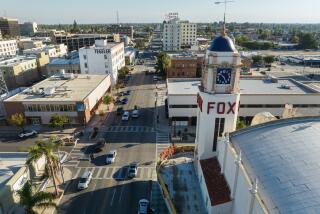INS Sweep of Strawberry Fields Nets 274 Illegal Aliens
As the caravan of cars sped into the fields Friday morning, raising clouds of dust, the shout went up among field workers: “La Migra!”
Dozens of Mexican workers dropped their baskets of strawberries and loped up the endless rows of green plants, heading for the nearby highway and the suburban housing tracts beyond. Others squatted in place and awaited the approaching Immigration and Naturalization Service officers. Some crawled under the fence that marks the boundary of Camp Pendleton and tried to hide in the heavy brush, only to be flushed out by INS agents.
An INS helicopter circled over the rolling hillsides, directing agents on horseback, in off-road vehicles and on foot to the workers’ hiding places.
Watching the adult game of hide-and-seek were about two dozen reporters, TV cameramen and photographers, invited along by the INS.
The morning sweep of the strawberry fields off Vandergrift Boulevard netted 168 illegal aliens. Added to an earlier raid on fields in the Strawberry Hills section of Vista, the day’s score for the 35 INS officers was 274. Most of the aliens were released at the Mexican border late Friday or early this morning.
Both pursuers and pursued appeared familiar with the game. The captured Mexicans stood quietly, awaiting the Border Patrol vans that would transport them to a holding pen in the South Bay and ultimately back to the Mexican border.
One group of workers obediently piled out of the van in which they had been imprisoned and helped Border Patrol officers push it back onto the dirt road from which it had skidded.
“Hey, lady,” one of them called to a passing reporter from the mesh-covered opening of a van in which he was locked. “Do a good thing, lady. Push down on that handle and let us out. We will bless you.”
Border patrolmen let two of the workers return to their living quarters so that one who had fled barefoot could put on his shoes and the other could finish dressing before being handcuffed and led to the waiting vans.
INS Regional Commissioner Harold Ezell accompanied his troops into the Oceanview Farms fields and conducted tours of the workers’ “hootches”--makeshift clusters of shelters fashioned of cardboard, plastic and wood.
Ezell said that, because of a manpower shortage, the INS conducts roundups of undocumented agricultural workers only when residents make complaints. Such complaints often include allegations that workers stole from them, harassed women and children, and started fires that endangered nearby housing tracts, he said. Ezell would not reveal who made the complaints that led to Friday’s raids.
In the strawberry fields, evidence of hasty flight by the workers included spilled containers of strawberries and discarded yellow vests worn by pesticide-spraying teams. At the makeshift villages, mesquite fires still smoldered, and damp washing hung on barbed-wire fences and bushes. A half-empty can of beer stood on an irrigation pipe that had been tapped to provide water for the worker encampment. A slime-greened pond ringed with bare footprints apparently served as a washtub and bathtub.
Six half-weaned pups found at one of the campsites posed a problem for the Border Patrol officers until three Marines in camouflage dress volunteered to adopt them. While their mother barked in disapproval, the pups were handed through the barbed wire to the Marines.
One workers’ camp sported a basketball court with a hard-packed dirt surface as well as a soccer field. The camp’s cardboard shelters and a series of “spider holes”--underground sleeping quarters--probably held 50 or 60 workers, the INS officials estimated.
Although the camp was littered with trash, plastic sacks of mashed aluminum cans were piled about, the dirt floors in the huts were swept clean, beds were made and firewood was neatly stacked beside makeshift grates.
Ezell shook his head at the non-existent sanitary facilities at the camp, and commented that “no one should be allowed to live in these conditions.”
But, he added, “these undocumented aliens we’ve rounded up today will be back, probably by Monday. There is only one way to solve the border problem, and that is for Congress to pass laws making it illegal to hire undocumented workers.”
Aliens working in low-paying agricultural jobs are not the problem, Ezell said. “But they get established here and then go on to better jobs in construction and in service industries--jobs that U.S. citizens should have.”
One Border Patrol agent surveyed the empty fields and said: “I feel sorry for these poor yahoos. By the time they get back, these hootches will be cleaned out of anything worthwhile. Their savings will be gone if they hid it somewhere. The ones we missed will come back here and take it all.”
More to Read
Start your day right
Sign up for Essential California for news, features and recommendations from the L.A. Times and beyond in your inbox six days a week.
You may occasionally receive promotional content from the Los Angeles Times.






